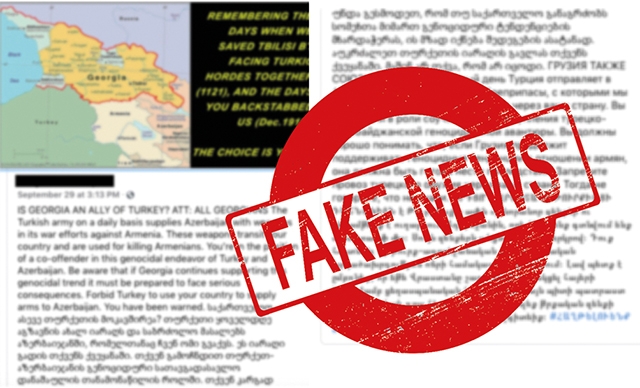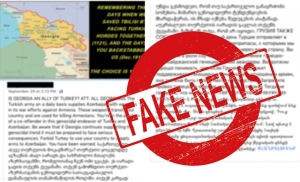The Second Karabakh War & the Information Warfare in Georgian-Armenian Relations
Op-Ed
It may seem unbelievable to some, but the citizens of neighboring countries, whose states have a centuries-old history of coexistence, know each other only by stereotypes and other oral traditions. This fact often leads them to irrational and sometimes even rational fears about each other. These forms of fear are not mutually exclusive, because you are naturally afraid of what is next to you, but you do not know what it is or what it wants. I’m very sorry to use such an introduction to this article on the information warfare in the Georgian-Armenian relations. My subjective opinion is that in case of intention, after the Georgia-Turkey issue, unleashing an “information war” between Georgia and Armenia is the easiest thing to do. As for me, this sad reality has deep psychological, historical and cultural roots, where truth and lie are intertwined. I also think that some “third party” contributed to this, and today we look at each other with fear and resentment.
Georgians are fairly offended when:
• Nobody can speak Georgian in Akhalkalaki or Ninotsminda;
• Famous Armenian politicians speak seriously about Javakheti’s accession;
• The leaders of the separatist ideology organization in Javakheti are cherished in Yerevan;
• Texts about “Great Armenia” are accompanied by maps showing the territories of Georgia;
• They recall the secret negotiations between the Dashnaks and Turks about the return of the disputed territories;
• They recall the Russian military bases in Armenia, despite my deep conviction that these bases should frighten the Armenians more than the Georgians.
Add to this the fact the atrocities committed by the Bagramian Battalion in Abkhazia are perceived among Georgians as a crime committed by the Armenian people;
In turn, there are Armenian images of perceiving and understanding Georgians and “Armenian narratives” describing these images. We have to look for its roots in the history. Some of these narratives include:
• Accusing Georgians of betraying Armenians in 1918 in connection with the Turkish armed aggression;
• Accusing the then Georgian government of inhumane treatment of Armenian refugees;
• Talking about the economic and communication blockade imposed by Georgia against Armenia;
There are also allegations of occupation of “indigenous Armenian lands” by the Georgian Armed Forces.
If we look at our modern history, we will find a new list of accusations, but here we will see one interesting reality: Georgian-Armenian relations go beyond “Tbilisi-Yerevan” relations; ethnic Armenians living in Georgia have also added diversity to the images and narratives of perceiving and understanding Georgians, and there appeared new accusations, namely:
• Getting an education in the Armenian language in Javakheti;
• Discrimination in the political or economic sphere;
• Legal prohibition of citizenship;
• Problems and complaints regarding the ownership of cultural heritage.
In short, as I said above, truth and lie are intertwined here as well, and someone must be very happy with this fact. These attitudes towards each other are naturally compounded by the foreign policy choices of both states. Official Tbilisi sees and estimates Yerevan more in terms of its relations with Moscow. In case of another Russian aggression in Georgia, Tbilisi sees Yerevan as neither an ally nor a neighbor with a neutral position. To the contrary: it is perceived as a potential threat. Nevertheless, the governments of both countries are still prudent and unwavering in implementing and firmly supporting the policy of cooperation and good relations. Georgians and Armenians were caught in such a difficult situation by the Second Karabakh War. It would be naive to think that this war would not affect Georgia in any way. Some experts predicted even worse scenarios. This time, we survived the worst.
During the Karabakh war, the Information Defense Legion, a group of volunteers I represent, revealed a key message that sought to discredit Georgia's position during the war and to blacken Georgians in the eyes of Armenians. This message was: “A Christian country that helps the enemy (Muslims)!“
This message was accompanied by supportive communication activities that were supposed to build the trust of the target audience:
1. A video was spread on the internet showing the Georgian police allegedly escorting the Turkish military cargo to Azerbaijan. This story was even covered by the Kremlin mouthpiece, соловьёв Live Show. The story was based on the inscription “Bayraktar” on one of the trucks that appeared in the video. In fact, the inscription on the truck had nothing to do with military production or the existing conflict” “Bayraktar” is a Turkish logistics (carrier) company.
2. A video on Tik-Tok by Armenian citizen Hamsik Eidyan went viral. He and his friend cursed the Georgian government and Georgians in the Russian language. The reason for this had something to do with the decision of the Georgian government not to allow the ethnic Armenians of Javakheti to export second-hand tires from Javakheti to Karabakh.
3. More anti-Georgian misinformation. Vladimir Khomeriki, President of the Foundation for the Unity of the Russian and Georgian People, and online media “Eadaily,” registered in the Russian Federation, were involved in it. They deliberately spread false information claiming the Ministry of Foreign Affairs of Georgia had barred the transit of medical and humanitarian aid from Russia to Armenia.
It is difficult to convey the communication effect of the above-mentioned false information on the population of the two countries, but the complexity of the situation is also proven by the fact that the Ambassador of the Republic of Armenia to Georgia even had to make am extraordinary statement on October 2. The Information Defense Legion finally became convinced of the gravity of the situation when the Georgian organization asked us to dispel the myths for their Armenian partner organization. They tried to convince their partners that the information that Georgia had obstructed the flow of fuel and humanitarian aid to Armenia was untrue.
It should be noted that the Kremlin is not the only party interested in the deterioration of Georgian-Armenian relations. For years, we have been watching various online media outlets that are actively trying to “cover” the population of Georgia. For example, Kavkazplus is actively trying to stir up anti-Armenian sentiments in Georgian society. In general, Twitter accounts associated with Azerbaijan are constantly active and engaged in anti-Armenian campaigns in Georgia. They clearly redoubled their efforts during the Karabakh War in various directions, namely by generalizing the atrocities committed by the Bagramian Battalion to the Armenian nation.
Even a superficial analysis of the relations between the two countries shows that the flow of information against Georgia, unfortunately, will not disappear without a trace. The narrative about “traitorous Georgians” was revived once again 100 years later and poisoned the minds of many Armenian citizens. This circumstance will not be an insignificant story for Georgia. I do not know how Official Yerevan views this story, but it would be better for the Georgian authorities to make effective use of strategic communications to improve the information space and to neutralize these anti-Georgian narratives that have emerged “thanks” to fake news.
I believe the promotion of good neighborliness and mutual respect should also be the pragmatic policy of Yerevan. Otherwise, we will remain hostages to our stereotypes and irrational fears, which will put a negative strain on the state and inter-ethnic relations between the two countries. It is noteworthy that the Caucasus is the home to peoples who, due to purely human relations, can also cause serious geopolitical shifts in the region. But, again, due to the peculiarities of the people living in this region, it is not necessary to consider the words I use, “serious” and “shifts,” only as words with a positive connotation.
By Giorgi Molodini, founder, Georgian Center for Strategic Communications
Image source: IDFI.ge












